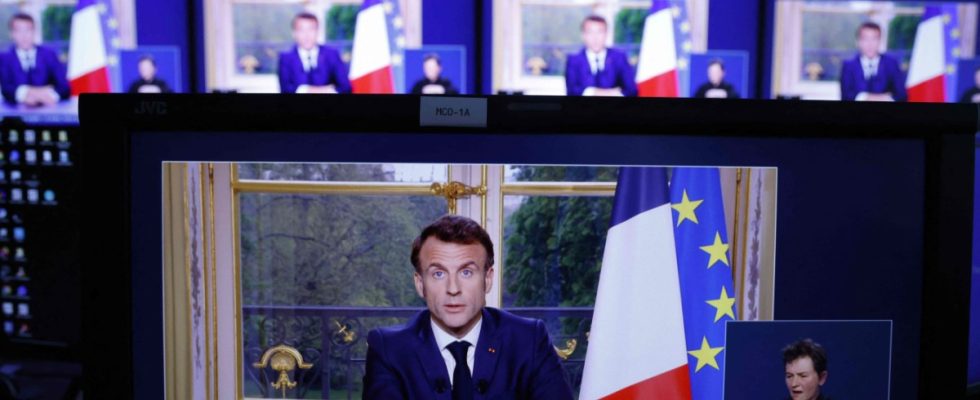French President Emmanuel Macron is a rare guest on French television. Actually. The fact that he explained himself in front of television cameras for the second time in four weeks this Monday shows that the situation is serious. Even if his pension reform has been a done deal since the end of last week.
Just a few hours after the Constitutional Council approved the core of the reform last Friday, the President signed the controversial law. The mood in the country has not calmed down since then. Right at the start of Macron’s speech at 8 p.m., opponents of reform called for protests in front of the town halls of several cities. More precisely: to concert de casserolesto hit the pot together.
Instead of leaning back, Emmanuel Macron is now sitting in front of the cameras in the Élysée Palace and reading from the teleprompter. During his last television appearance, he was interviewed by two journalists, this time he chose a pre-recorded speech – preferably not live, preferably without questions.
“I’m sorry”
After the decision of the Constitutional Council, he “logically passed the law,” says Macron right at the beginning. It should come into force in the fall. But the President also says: “Is this reform accepted? Apparently not. […] I regret that.”
So far, Emmanuel Macron has not been self-critical in the pension debate. In his television interview four weeks ago, when asked whether he had any regrets, he replied: “If anything, it’s that we didn’t manage to convince the French of the need for this reform .”
Whenever the question of the legitimacy of the reform came up in the past few weeks, Macron referred to his re-election. After all, reform was part of his program. Macron was only elected last year to prevent Marine Le Pen, say the president’s opponents on the street. According to surveys, more than half of the French are still against the pension reform.
Nobody can turn a blind eye to the anger and demands for social justice, Macron said on Monday. But the answer to that should be neither stagnation nor extremism. He then suggests several “construction sites” that he wants to tackle in the coming months: work, justice, education, health. Even if he promises “concrete measures”, the announcements remain rather vague.
“The door stays open”
He wants to start “a new pact” to work, among other things, to increase wages and distribute wealth better. He wants to hire 10,000 new administrative officers and 200 new police brigades. He wants to improve medical care for the chronically ill and combat the shortage of teachers.
If the president had his way, the pension reform chapter couldn’t be closed fast enough. The left-wing opposition and the trade unions naturally see things differently. “The fight goes on”, tweeted the founder of far-left La France Insoumise, Jean-Luc Mélenchon on Monday evening. “You don’t have to tell us that you can hear our anger,” said Laurent Berger, head of France’s largest trade union, the CFDT. That doesn’t change anything for the people who now have to work longer.
“The door remains open,” Macron told the unions on Monday. Even before his speech, Emmanuel Macron had invited the union leaders to an interview. But they refused. Their stipulation was that Macron did not enact the law. One day the CFDT will come to dialogue, says Laurent Berger on Monday evening. “But not if we are whistled to.” For the. On May 1st, unions call for another nationwide day of protest.
Macron has governed no differently than many of his predecessors in recent months. In the past, French presidents have repeatedly pushed through unwelcome laws without a vote in parliament. The French constitution gives the president a great deal of power. However, Macron started out to do everything differently. To break up the old structures, to listen, to mediate between left and right. Many in France are now wondering if Macronism has failed.
In recent weeks, calls for a government reshuffle and the resignation of Macron’s Prime Minister Elisabeth Borne have grown louder. In relation to this, Macron only said on Monday: “The prime minister will continue to work out the timetable from next week.” The national holiday on July 14 is then a first opportunity to assess progress. Sounds like the government will stay in office for now.
Since his re-election last year, Emmanuel Macron had repeatedly promised a “new method”. He hasn’t changed much in his style of government since then. The seat ratio in parliament also remains difficult for Macron and his ministers. They still only have a relative majority and are dependent on votes from the opposition. And they’ve been even harder to come by since the prime minister pushed through pension reform through a constitutional clause.
Macron’s government intends to present a draft of a new labor law by the summer, which is intended to supplement the pension reform. It is also unclear whether she will find a majority for this. A controversial migration law that the government actually wanted to bring to parliament weeks ago has now been shelved for the time being.
“I trust you. And I trust us,” Emmanuel Macron said in his speech on Monday. In the end it only lasted 13 minutes.

